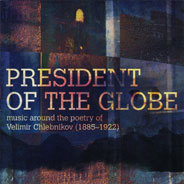President
Of The Globe
President
Of The Globe
(TryTone)
I
received a small packet - sender unknown, just as unknown to me was the
name of what at first I thought to be the name of the group that had recorded
the CD: President Of The Globe. Reading the liner notes to the CD (written
in English) I soon learned that President Of The Globe was the inscription
on the coffin of Velimir Chlebnikov (1885-1922), the Russian poet who had
co-authored the manifest of the St. Petersburg's Futurists called A Slap
In The Face Of The Public Taste; his poetry is put into music on this CD.
Here
we have five musicians: Tobias Klein on clarinets, alto sax and live-electronics;
Albert van Veenendaal on piano (also prepared) and sampler; Meinrad Kneer
on double bass (those three being the writers of all the music); also Elisa
Roep, a classically trained soprano, and the more informal, colloquial
vocal style of Alec Kopyt. Upon first listening, the album sounded very
interesting to me, even if I needed to subtly adjust my attitude: classically
trained female vocalists are not automatically my cup of favourite beverage,
plus the singing approach on the part of the male vocalist, at times sardonic,
at times mysterious, made me think I really had to have a look at the lyrics
(no problem here: of course, they were featured inside the CD booklet,
right?). The players were really excellent, brilliantly capable of doing
justice to all the styles on the album (and there are lots of them!). The
shock arrived when I discovered that the featured texts were only available
in: the original Russian version; translated into Dutch and German. And
now...?
Come
to think of it, from Gangsta-Rap to Japanese-Pop, it's not that the understanding
of the lyrics is something that we take absolutely for granted in order
to appreciate the music; what's more, I know lotsa people who have never
bothered to open a CD booklet to see whether the lyrics are included (and,
provided they were, tried translating them); but a (so-called) critic must
use a different set of rules, right? Many listening sessions later, I decided
that, with just a couple of exceptions, the album could be appreciated
even if the lyrics were not understood. Fans of the "East European" styles
of Rock In Opposition will find something they already know in the track
Gagagaga (for this writer, it's the only weak track on the album). The
mix of classical-chamber music, elements of jazz and sparks of improvisation
- everything brilliantly supported by a crystal-clear recorded sound -
makes it easy to enjoy the voices in their timbral side. As partial exceptions
I'll mention: the male voice on Zazov, where my curiosity about what was
being said distracted me quite often; the narration in De Vogels, where
(what to me sounded like) an oscillator appeared to want to replicate the
sounds of birds; and in Blagovest Umu (is it really about a clock?).
The
singers being agile and versatile, the compositional and playing sides
are excellent: check the intricate atmosphere in Grashupfer, where we have
a very beautiful clarinet solo; the melodic theme in Van Blauwige, and
the double bass solo which follows. I was pleased to hear what to me sounded
like an echo of Braxton in Wenn Pferde sterben, where Tobias Klein plays
the alto saxophone. I really have to point out the maturity and complexity
(and the way it all sounds so natural!) of the writing in Sie!, a track
which is introduced by a bass clarinet and a noisy sampler, where bits
of Ellingtonia are followed by a melodic vocal phrase which sounds as having
been put together by Phillip Glass, and later by an animated conversation
between piano and double bass; and in Litso, where a folk-sounding vocal
theme is followed by a relaxed trio of clarinet-piano-double bass.
Beppe
Colli
©
Beppe Colli 2006
CloudsandClocks.net | Sept.
9, 2006











